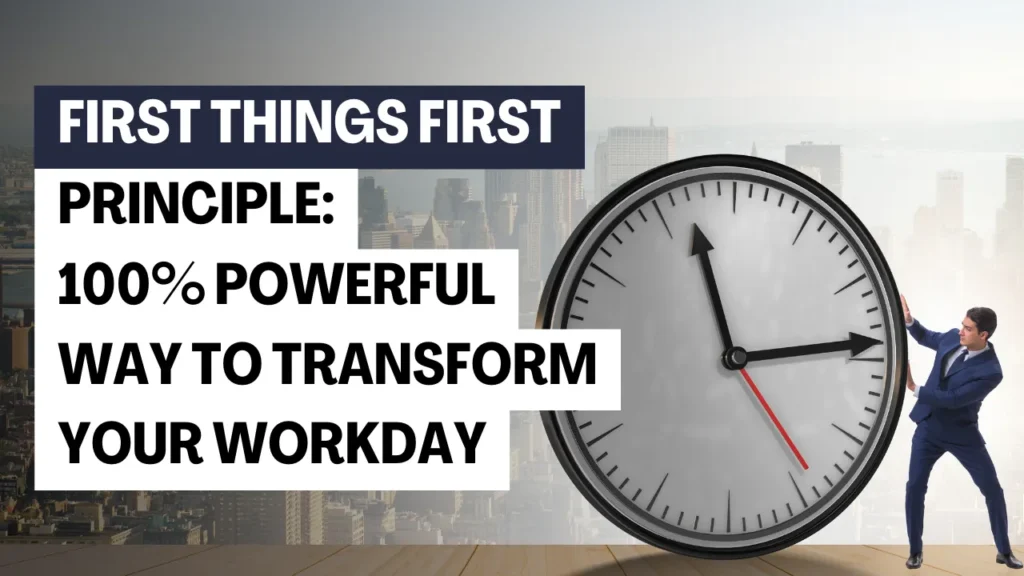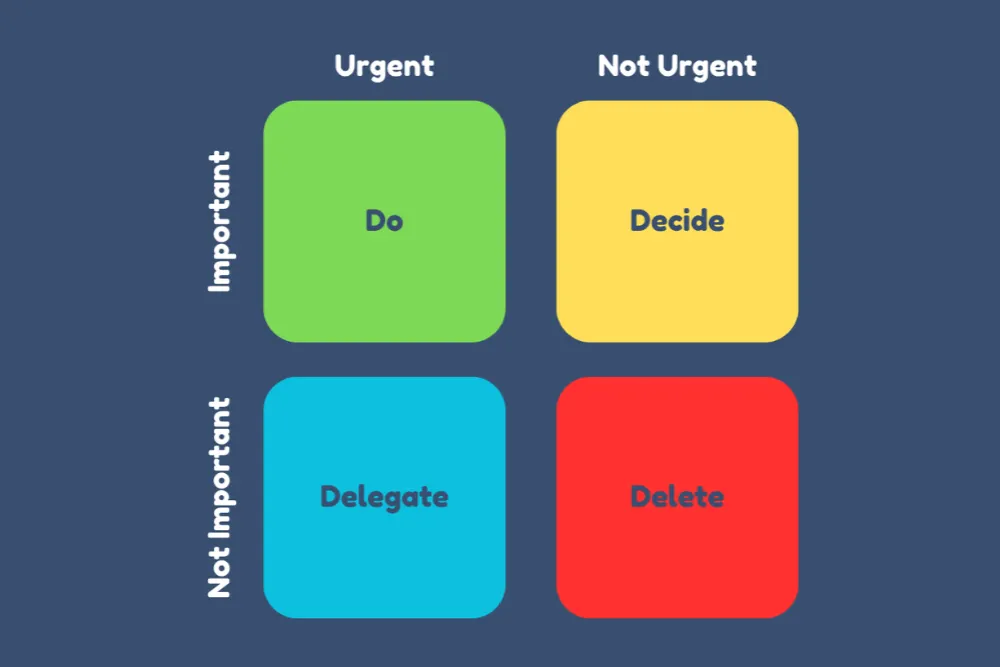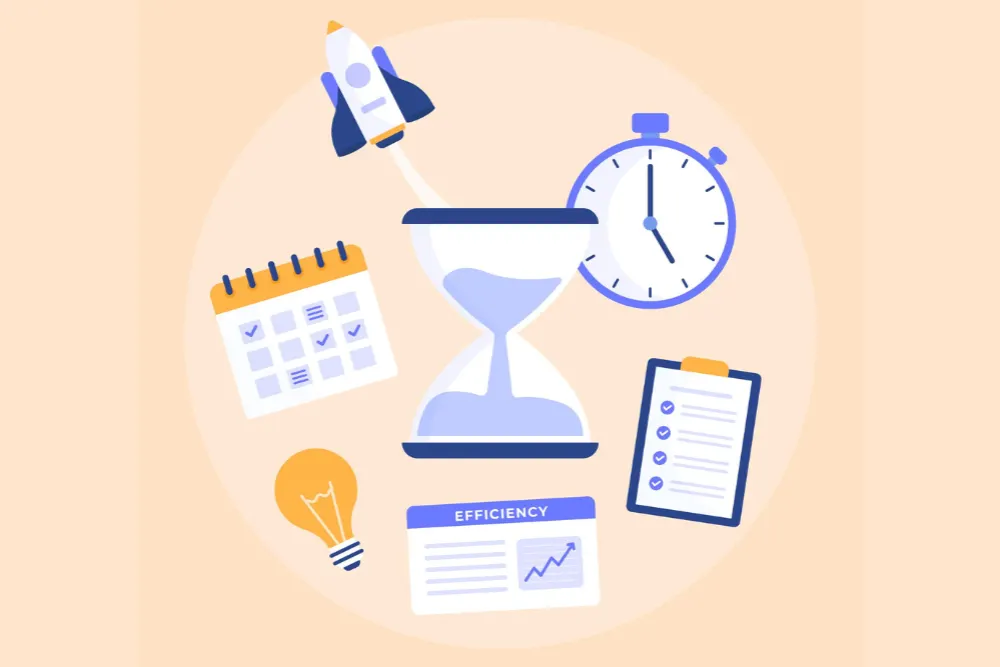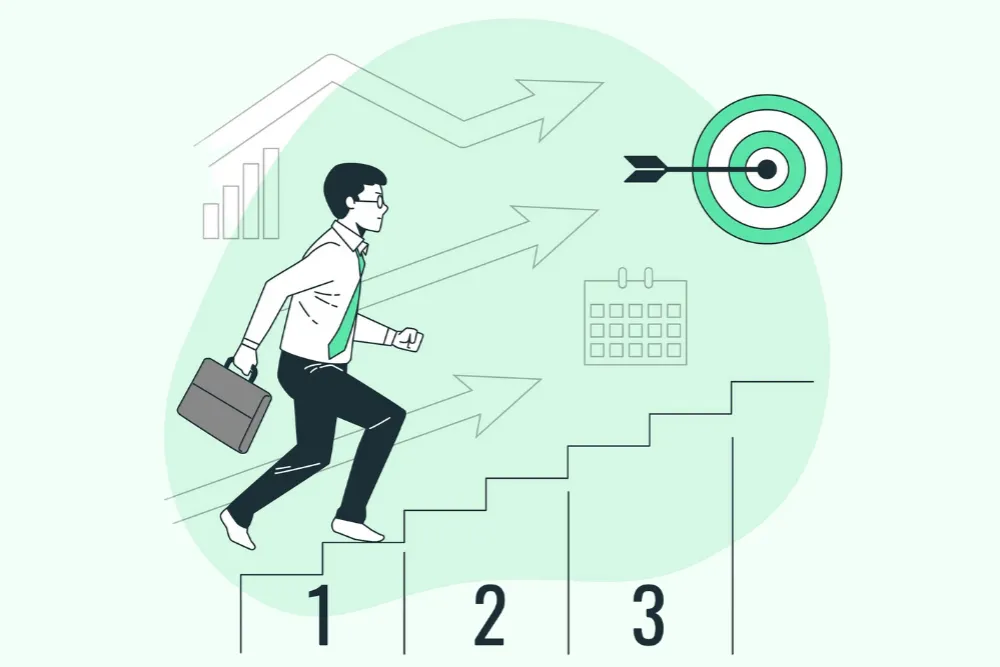Physical Address
304 North Cardinal St.
Dorchester Center, MA 02124
Physical Address
304 North Cardinal St.
Dorchester Center, MA 02124

Every professional seeks a productive and purposeful workday, yet the demands of modern work often lead to chaos. The First Things First principle provides a clear framework to focus on what truly matters, emphasizing intentionality over busyness. By aligning your efforts with core values and long-term goals, you can transform your workday into a structured and impactful experience.
Popularized by Stephen Covey, this principle prioritizes significance over urgency. It encourages deliberate focus on high-value tasks, helping you shift from reactive firefighting to purposeful progress, ensuring your energy is spent on meaningful, lasting results.

Emerging from the time-tested wisdom of Covey’s The 7 Habits of Highly Effective People, the First Things First principle is a cornerstone of effective time management. Its core concept lies in focusing on tasks that hold intrinsic value rather than succumbing to the tyranny of the urgent. This framework is grounded in intentional decision-making, fostering a sense of control and purpose in your workday.
In a world saturated with deadlines, notifications, and constant connectivity, it’s easy to mistake activity for productivity. The First Things First principle serves as a compass, guiding professionals to invest their energy in endeavors that yield lasting results. It helps combat burnout and ensures that your efforts contribute meaningfully to both professional and personal growth.

Mismanaged priorities come at a steep price. They drain time and energy, leaving you perpetually behind schedule. Worse, they foster a sense of frustration as trivial tasks overshadow critical objectives. The inability to prioritize effectively creates a ripple effect, eroding both confidence and productivity.
Effective prioritization is the cornerstone of sustained success. It enables professionals to allocate their resources wisely, focusing on activities that drive results. By consistently prioritizing meaningful tasks, you cultivate a sense of accomplishment and lay the groundwork for achieving ambitious goals.

Not all tasks are created equal. Urgent tasks demand immediate attention, but they’re often less important in the grand scheme of things. Important tasks, on the other hand, contribute to your long-term objectives. Recognizing the difference between these categories is crucial to mastering prioritization.
A clear understanding of your overarching goals is essential for effective prioritization. Ask yourself: What outcomes do I want to achieve today? Which tasks align with my long-term vision? By clarifying your objectives, you can create a workday that is purposeful and productive.

The Time Management Matrix divides tasks into four quadrants based on their urgency and importance. This simple yet powerful tool helps professionals identify which activities deserve their attention and which can be deferred, delegated, or eliminated.
Focusing on Quadrant 2 tasks ensures that you spend your time on activities that matter most.

A well-crafted morning routine sets the tone for a successful day. Begin by reviewing your goals and identifying your top priorities. Incorporate practices such as mindfulness or journaling to cultivate a focused mindset.
Define specific, measurable objectives for your workday. This clarity prevents you from drifting into unproductive tasks and ensures that your efforts align with your larger goals.

Start your day with high-value activities when your energy and focus are at their peak. Prioritizing these tasks ensures that your most important work receives the attention it deserves.
Midday often brings unexpected demands. Take a moment to reevaluate your priorities and adjust your plan as necessary to stay aligned with your goals.
As energy wanes, it’s crucial to stay engaged. Focus on less demanding but still meaningful tasks, or take a brief break to recharge and return with renewed focus.

Distractions are inevitable, but they can be managed. Turn off non-essential notifications, establish boundaries, and create a workspace conducive to focus.
Learning to say “no” is an invaluable skill. Politely but firmly decline tasks that detract from your priorities, freeing up time for what truly matters.

Identifying tasks that can be handled by others is an essential part of applying the First Things First principle to your workday. Not every task requires your personal involvement, and by delegating routine or specialized tasks to colleagues or assistants, you free up valuable time for high-value activities. This allows you to focus on initiatives that align with your expertise and objectives, ensuring that your energy is directed toward the most important tasks. By embracing delegation as part of the First Things First approach, you can maximize productivity and ensure that your efforts are spent on what truly matters.

Conclude your day with a brief reflection. Assess what you accomplished, identify areas for improvement, and celebrate your successes.
Use your reflections to refine your approach for the next day. Adjust your priorities as needed to ensure continued progress toward your goals.

Living by the First Things First principle offers numerous long-term benefits that enhance both your professional and personal life. Here are some key advantages:
Embrace the First Things First principle to transform your workday and your life. Start today by identifying your priorities and committing to a more focused, intentional approach. Use powerful tools like task management apps such as Trello or Asana, digital calendars for scheduling, and reflective journaling apps to evaluate and refine your daily plans. These resources can help you stay organized, track progress, and ensure your energy is directed toward meaningful goals. The journey toward a purposeful and productive workday begins with a single decision to put first things first. Equip yourself with the right tools and strategies to make it happen.